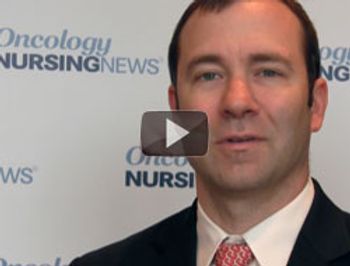
Caregivers of patients with GBM have an increased time burden and can affect the quality of life of the caregiver and, potentially, the patient with cancer.

Caregivers of patients with GBM have an increased time burden and can affect the quality of life of the caregiver and, potentially, the patient with cancer.

A recent study found that yoga could improve overall quality of life for patients with high grade glioma, as well as their caregivers.

As clinical providers, the ability to meet the science of medicine with its physical, emotional, spiritual, and financial impact it has on patients is often unintentionally overlooked or, at the very least, minimized during the active treatment phase of care; therefore, the purpose and potential benefits that result from integrating palliative care early on in the process is missed.

Massage therapy may offer relief to patients suffering from chemotherapy-induced peripheral neuropathy (CIPN).

Couple's communication skills training can help couples facilitate important conversations when one partner has advanced cancer,

Palliative care can be beneficial to patients treated with hematopoietic stem cell transplantation.

The COMFORT curriculum is an evidence-based communication training course and train-the-trainer program for oncology nurses, who then pass their education on to other healthcare providers.

Palliative care access can be impeded by frontline cancer center office staff members if they do not understand the services.

Patients with newly diagnosed incurable lung and GI cancer saw benefits from early palliative care services.

Christopher R. Friese, PhD, RN, AOCN, FAAN, assistant professor, Division of System Leadership and Effectiveness Science, University of Michigan School of Nursing, discusses the benefits of using a systematic approach to assess toxicities of patients treated with chemotherapy.

Anna Ferguson RN, BSN, research nurse, Johns Hopkins Sidney Kimmel Comprehensive Cancer Center, discusses how to talk about hope with patients who have been diagnosed with cancer.

Michelle Farnan, RN, MSN, OCN, palliative care nurse coordinator, Penn State Hershey Medical Center, discusses the impact of a palliative care screening tool for inpatient oncology patients.

Jeannine Brant, PhD, APRN, AOCN, oncology clinical nurse specialist, nurse scientist, Billings Clinic, discusses the best way to integrate palliative care and what role the nurse can play in palliative care.

Approximately one-third of cancer survivors in the US reported a financial problem or the need to modify work plans.

Eighty-nine percent of patients with cancer reported making lifestyle modifications to cope with the high costs of cancer treatment, and more than one-third altered their medical care, according to the results of a new nationwide survey, underscoring the need for oncology practitioners to screen for and anticipate potentially harmful cost-coping behavior to alleviate patient distress and promote optimal care.

A "co-rounding" model partnering medical oncologists with palliative care specialists was associated with improved outcomes at an inpatient oncology unit, according to a retrospective cohort analysis presented at a presscast ahead of the 2014 Palliative Care in Oncology Symposium.

A telephone-based symptom monitoring and coaching system not only alleviated hospice patients' symptoms during their final weeks of life, it also improved the well-being of family caregivers, according to a new study.